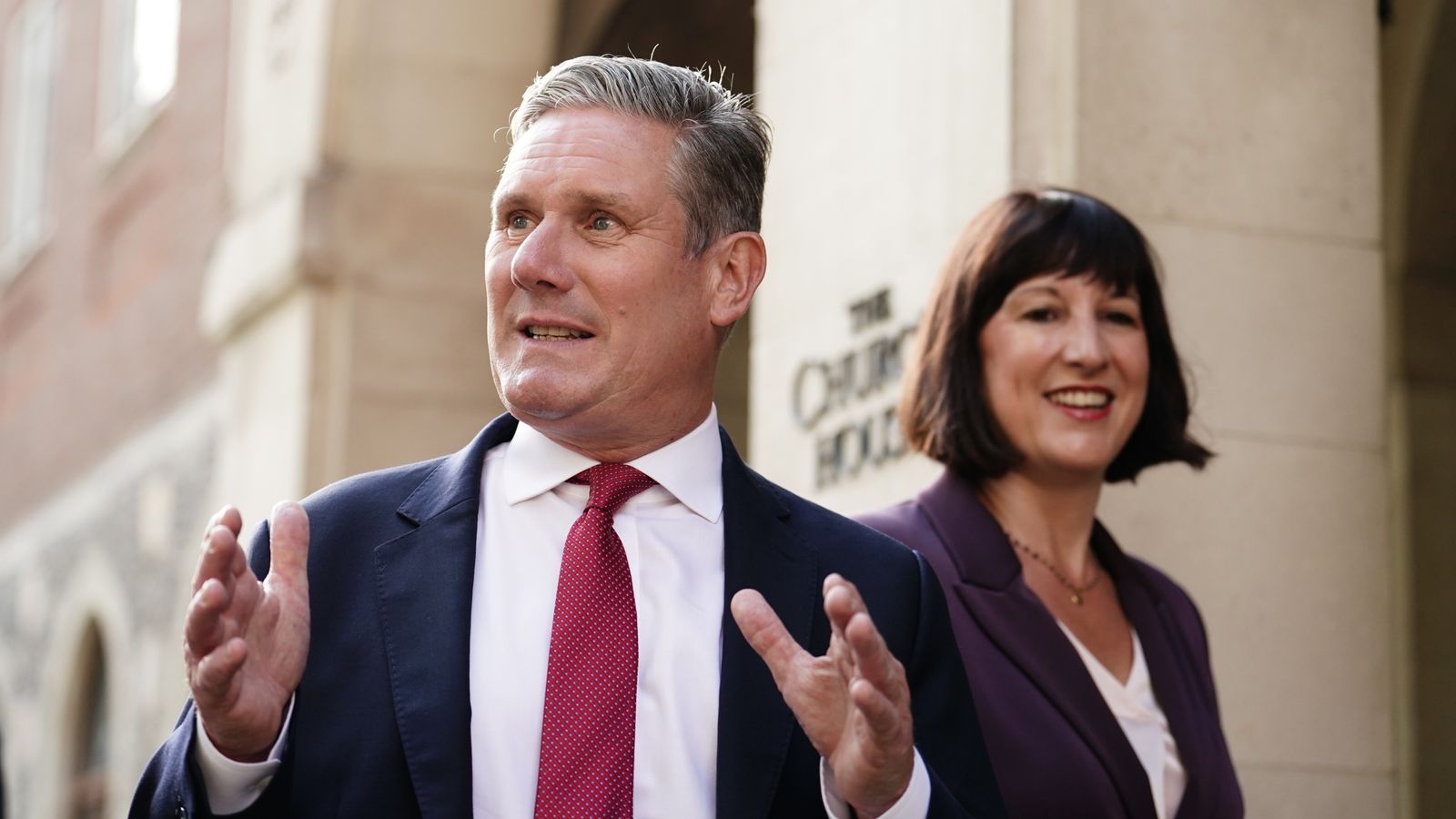Labour has pledged to bolster the power of the UK’s economic watchdog to prevent a repeat of the “disastrous mistakes” of Liz Truss’s mini-budget.
Labour leader Sir Keir Starmer has vowed to introduce legislation that would allow the Office for Budget Responsibility (OBR) to independently publish their own impact assessment of any major and permanent tax and spending changes.
His shadow chancellor, Rachel Reeves, said it meant that “never again” can the “disastrous mistakes” of the former prime minister be repeated, ahead of the first anniversary of her “fiscal event”.
Tories accuse Starmer of wanting to ‘return to agonies of the past’ – politics latest
The mini-budget last September spooked the markets and sparked a huge economic fallout, pushing up government borrowing costs and putting certain pension funds on the brink of collapse.
One of the reasons for the markets’ reaction was that Ms Truss and her chancellor, Kwasi Kwarteng, refused to publish the OBR’s independent forecasts for the public finances alongside the plans.
The party said under its plans, ministers would be forced to open their books to the forecasters – though any government wanting to disregard them could seek to reverse the legislation.
It said families and businesses are “still paying the price” for her “crashing the economy” – with households coming off fixed rate mortgages paying an average of £220 more a month and inflation forecast to be the highest in the G7.
They have billed their proposal as a “fiscal lock” which would ensure fiscal stability by:
- Amending the legal framework governing the OBR to guarantee that where a fiscal event makes permanent tax and spending changes over a certain threshold, the fiscal watchdog can independently publish a forecast of the impact
- Setting out the threshold in a revised charter of budget responsibility, that would be voted on in Parliament
- Ensuring that in the event of an emergency where changes must be introduced at speed and a forecast cannot be produced in time, the OBR would be allowed to set a date for when it can publish its forecast
- Setting out a fixed timetable for budgets that would say major fiscal decisions are announced by the end of November each year, allowing businesses and families four months to prepare for the new tax year and avoiding major changes to policy at the last minute
- Annual autumn budgets would be followed by a spring update in early March providing an updated forecast and minor policy changes
James Murray, Labour’s shadow financial secretary to the Treasury, told Sky News this morning it was “absolutely crucial to legislate because we all remember what happened a year ago”.
He accused the Tories of having “set the economy on fire” with the mini-budget that “sidelined the OBR”.
“Never again should a prime minister and a chancellor be able to play fast and loose with public finances and damage the economy and household budgets in the way they have,” he added.
Speaking ahead of a visit with the Labour leader to the London Stock Exchange on Friday, the shadow chancellor said: “The economic damage done by the Conservatives’ mini-budget was nothing short of disastrous and Britain is still paying the price, with higher mortgages, higher energy bills and higher prices in the shops.
“As chancellor, my mission will be to bring stability back to our economy because that is the only way we can bring growth back. Never again can a prime minister or chancellor be allowed to repeat the disastrous mistakes of last year’s mini-budget.
“Labour will introduce a new fiscal lock to strengthen the UK’s financial stability to prevent the turmoil we witnessed this time last year. Labour will ensure stability returns to our economy and on that rock of stability working people will be better off.”
Labour has been seeking to pitch itself as fiscally prudent, prioritising stabilising the economy over big spending commitments in a move that has angered some unions and those on the left.
They have sought to weaponise the anniversary of the Truss mini-budget to hammer home their message of fiscal responsibility, while highlighting the government’s record on the economy.
Ms Truss’ £45bn package of unfunded tax cuts, which she admitted would primarily have benefited the wealthy, sent the pound tumbling, interest rates soaring and culminated with the Bank of England having to intervene to prevent pension markets from collapsing.
Although she rowed back on her measures and sacked her chancellor, Kwasi Kwarteng, it was not enough to save her administration from collapsing and she resigned after just 49 days in the job – making her the shortest serving prime minister in British history.
She is still facing criticism over her actions, with the former Bank of England governor Mark Carney this week accusing her of turning Britain into “Argentina on the Channel” instead of “Singapore on the Thames”.
But Ms Truss has remained unrepentant, blaming “institutional bureaucracy” for her downfall.


